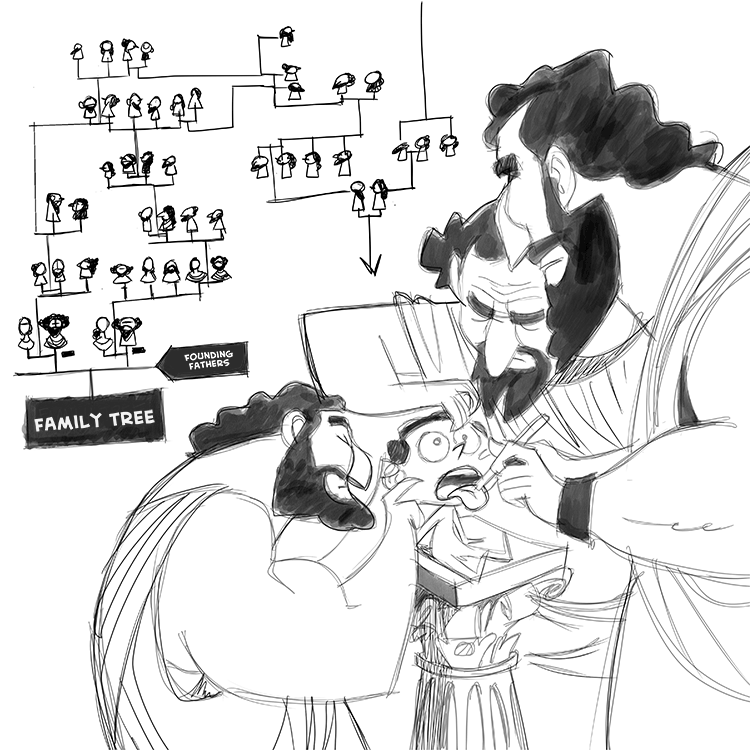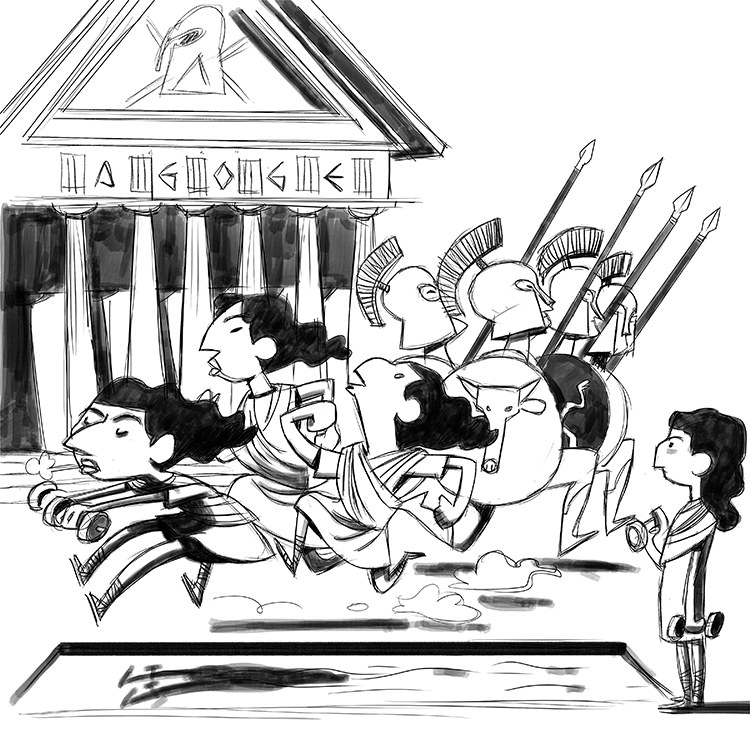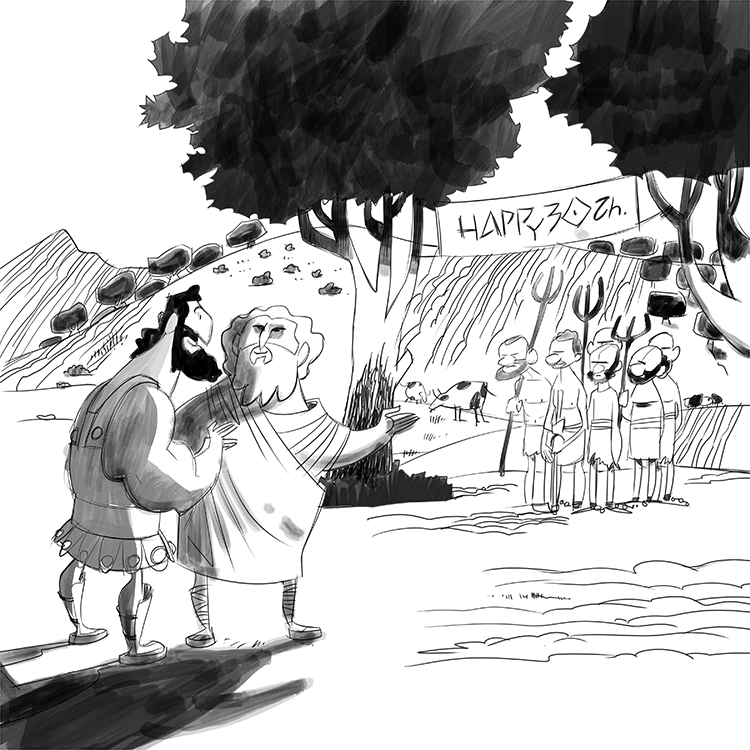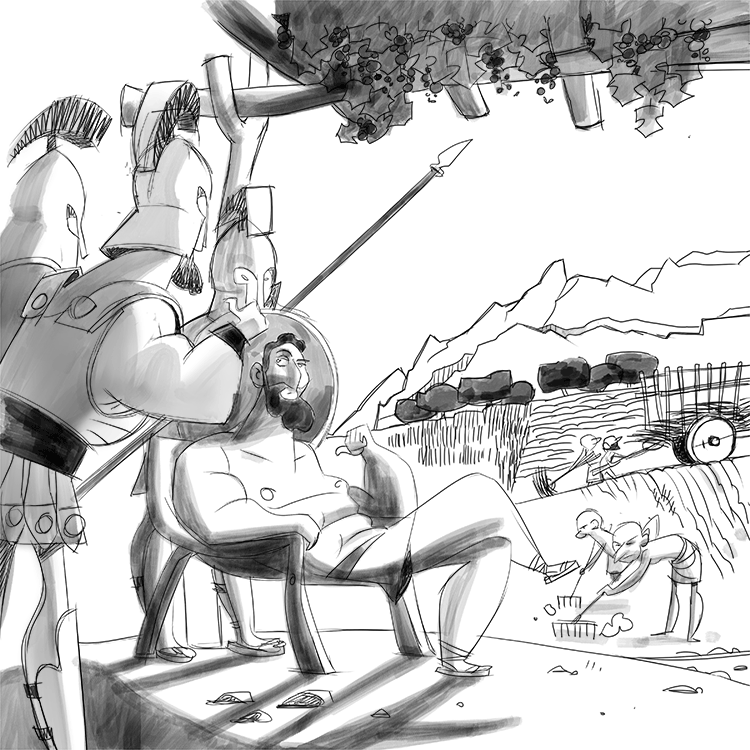It’s hard to imagine the people of ancient civilizations living “the good life.” They didn’t have running water, electricity, medicine, cars, planes, and so many other things we moderners assume make a quality existence.
But in ancient Sparta, a select group of individuals, known as citizens, held all the political power and all the money. And they were also forbidden from doing manual labor and business.
In other words, they had everything and didn’t have to work.
Sounds pretty good, right?
Well, not so fast. Life as a Spartan citizen may seem pretty good, but there was much more to it, mostly discipline and war.
So, before we jump to the conclusion that the Spartans had it made in the shade, let’s take a look at what life as a Spartan citizen was actually like.

Spartiates: Citizens in Waiting
At the very top of Spartan society were those who could trace their lineage back to the original Spartans, the ones who founded the city back in c. 800 BC. These individuals were known as “Spartiates.”
Both men and women could be Spartiates, but only men could become Spartan citizens.
Spartiate women were given considerably more freedoms than women living in ancient Greece, and were also allowed to own land and be educated. But the Spartan citizens that made the ancient Greek city-state famous were all men.
Once again, history is nothing but a boys club.
But just being a Spartiate man wasn’t enough to earn status in ancient Sparta.
You had to prove your worth, and that meant being strong, athletic, cunning, disciplined, and more.
The first assessment of these qualities was done at birth. Priests and other high-ranking officials would examine newborn babies, and if they had any sort of “defect” or perceived “weakness,” they were brought to the foothills of nearby Mt. Taygetos and left to die.
Have we used the word ruthless yet to describe the ancient Spartans?
But before we go scolding the Spartans, it’s important to note that many other cultures, both inside and outside ancient Greece, did this.
It’s possible to see why — in ancient times, caring for children with extra needs was often impossible, and society had little place for people who couldn’t care for themselves. But with our modern lens, it’s hard to see this practice as anything but cruel and brutal.

Agoge
Training to be a Spartan Citizen
Spartiate men who did make it past this rigorous initiation were put into a special school — the agoge — starting at the age of seven.
Of course, the family of the boy had to pay for their son to attend this school, and if they couldn’t, then their son was basically doomed. Being a Spartiate who didn’t become a Spartan citizen was effectively an invitation to leave Sparta, or live the rest of your life in shame.
The primary focus of training at the agoge was on how to be a warrior.
This is because being a Spartan citizen was synonymous with being a soldier. Defending Sparta against its foes, and maintaining its highly-unequal social order, was the primary function of a Spartan citizen, and this required intense training and preparation.
Part of the reason the agoge was such an effective training area was because there were a lot of rules.
The first rule was that you had to be a Spartiate. But there were exceptions.
For example, foreign boys could be invited to the agoge to be trained. These kids were known as trophimoi, but there were very few of them. They had to come from important families from other parts of Greece. And, in addition to being invited, they had to pay their own way, of course.
The other exception was the syntrophos. These were the sons of slaves who had been adopted by Spartan families. A rarity, these boys, upon successful completion of the agoge, could become Spartan citizens, one of the few examples of upward mobility in Spartan society.
Once in the agoge, students were forbidden from seeing their families, and they were expected to learn how to fight, live off the land, steal food, and many other things that would later make them good fighters.

Trust
In addition, a lot of emphasis was put on building trust and connection amongst the boys. This would help make them a more cohesive fighting unit down the road.
Part of the way they did this was by putting students in difficult situations, such as dropping them off in the woods somewhere to survive on their own.
In modern times, we would call this hazing, a practice often included in initiations to college fraternities and sororities. But in ancient times, it was just training.

Becoming a Spartan Citizens
Spartiate boys studied in the agoge until they were twenty, and if they successfully graduated, they became full-blown Spartan citizens.
Becoming a full-fledged Spartan citizen was a great honor and privilege, but it also came with considerable responsibility.
For one, despite finishing school, recent grads of the agoge were not allowed to live on their own. They were expected to continue living in military barracks so that they could continue training.
This might not have been so bad, except that Spartan men usually married around 18 or 20, and while living in the barracks they were technically forbidden from seeing their wives.
Of course, this rule was loosely enforced, and the men would frequently sneak out. This is what happens when you make sneakiness and cunningness a key part of education…
But it also might not have been a big deal since Spartan citizens didn’t spend a lot of time actually in Sparta. They were first and foremost soldiers. And so once they finished their training, they were often traveling and fighting wars.
Or, if not at war, they were out terrorizing the slave population to keep them in check and avoid any uprisings.
When they returned to Sparta, they would crash at the military barracks and continue to train, until they were old enough to be given the privilege of living on their own.

Life as a Spartan Citizen
At the age of thirty, Spartan citizens were given a plot of land where they could finally live on their own with their families.
This land was to be the source of their wealth. BUT, since Spartan citizens were considered so important, they were not allowed to do any manual labor.
So, in addition to being given land, they were also given some slaves — known as helots in ancient Sparta — to do the work for them.
Spartan citizens were also not allowed to engage in business, so they would have to rely on relationships with the free members of society, known as the perioeci, to sell their bounty and earn them enough money to survive, as well as make their armour and weapons for war.
Did we mention Spartan society was unequal?
The Syssitia
Being given land and slaves was a nice recipe for getting rich in the ancient world. But excessive wealth was not a good look in ancient Sparta. Remember, they were supposed to be disciplined, minimalist, strict, etc.
But it was easy to avoid getting rich, for Spartan citizens who were required to belong to a syssitia, which was essentially an ancient mess hall, i.e a cafeteria.
To try and maintain the close connections among Spartan citizens, membership at a syssitia was required. In addition, you were compelled to eat at least one meal per day there.
Membership to these clubs cost money. Well, not money but bounty, mainly food. The idea was that since you were eating there daily, you should contribute to the meals. A fair bargain.
However, since there were so many people eating at these mess halls, membership wasn’t cheap. And if you mismanaged your land and couldn’t pay the bill, you could get in big trouble and maybe be stripped of your citizen status.
So What Did Spartan Citizens Actually Do?
Since they were forbidden from manual labor and commerce, it’s a fair question to ask. It seems like Spartan citizens lived the good life, kicking back and letting others do the work for them.
But this was far from the truth.
Sure, Spartan citizens were exempted from some of the more difficult aspects of human life, but they had lots of other responsibilities. For one, they had to make sure their land was profitable enough for them to pay all the expenses that came with being a citizen.
And, oh yeah, war.
Remember, Spartan citizens were first and foremost soldiers. They spent all that time in school so that they could fight, and most of their lives were spent doing so.
Because they were so well-trained, Spartan citizens didn’t often die in battle, so this wasn’t a major concern. But this started to change in the 5th century BC when Sparta became increasingly involved in foreign wars.
Still, a life at war would have certainly taken its toll.
Despite the struggle, serving in the Spartan army was the end-all-be-all for Spartan citizens.
The Assembly
When Spartan citizens were in Sparta, they were expected to participate in the management of the state. All Spartan citizens were part of the Assembly, which was the city’s main legislative body.
This group would elect the gerousia and the ephors, the first being a council of elders and the second a small group of five people who would enforce the laws in Sparta. There were also two kings — called the “first Spartans” — who played a key role in Spartan lawmaking,
“The Elders”
Spartan citizens who were too old to fight remained in Sparta and were called “elders.” Many of them held important political positions, but even those who didn’t were held in high regard, especially if they had had a long history of success and glory on the battlefield.
Those who made it to this status truly were at the top of Spartan society.
The Spartans that Made Sparta Famous
In truth, Spartan citizens and Spartiates made up a very small percentage of Spartan society. But they held all the wealth and power, and wrote all the stories we know about Spartan history.
It was from their way of life that we get modern words such as “spartan” and “laconic,” but there were many other Spartans whose stories we will never know.
Nevertheless, the extreme conditions of Spartan citizenship, as well as their unique privileges, helped Sparta stand out in the ancient world, as well as make it the feared military powerhouse it became.
Written by Matthew Jones
Illustrated by Pablo Velarde Diaz-Pache
